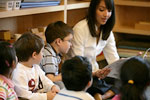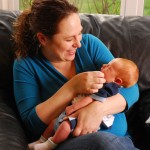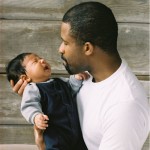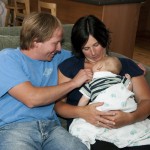Center on the Developing Child Harvard University
 Science tells us that experiences early in life may have long-term consequences for a child’s learning, behavior and both physical and mental health.
Science tells us that experiences early in life may have long-term consequences for a child’s learning, behavior and both physical and mental health.
Some types of “positive stress” in a child’s life (overcoming the challenges and frustrations of learning a new, difficult task, for instance) can be beneficial. On the other hand, severe, uncontrollable, chronic adversity (defined as “toxic stress” ) can produce detrimental effects on developing brain architecture as well as on the chemical and physiological systems that help an individual adapt to stressful events.
Read more »
 Many young children, particularly those between the ages of 3 and 5 years, develop imaginary friends. Children this age are typically beginning to decipher the boundaries between fantasy and reality, and their “new” imagined friends are part of this process.
Many young children, particularly those between the ages of 3 and 5 years, develop imaginary friends. Children this age are typically beginning to decipher the boundaries between fantasy and reality, and their “new” imagined friends are part of this process. 
 February 21, 2011
February 21, 2011 Science Daily
Science Daily Center on the Developing Child Harvard University
Center on the Developing Child Harvard University A growing body of scientific evidence demonstrates that emotional development begins early in life and is closely connected with the emergence of cognitive, language and social skills. Early emotional development lays the foundation for later academic performance, mental health and the capacity to form successful relationships.
A growing body of scientific evidence demonstrates that emotional development begins early in life and is closely connected with the emergence of cognitive, language and social skills. Early emotional development lays the foundation for later academic performance, mental health and the capacity to form successful relationships. This edition of the InBrief* series addresses basic concepts of early childhood development, established over decades of neuroscience and behavioral research, which help illustrate why child development—particularly from birth to five years—is a foundation for a prosperous and sustainable society.
This edition of the InBrief* series addresses basic concepts of early childhood development, established over decades of neuroscience and behavioral research, which help illustrate why child development—particularly from birth to five years—is a foundation for a prosperous and sustainable society. The foundations of brain architecture are established early in life through a continuous series of dynamic interactions in which environmental conditions and personal experiences have a significant impact on how genetic predispositions are expressed. Because specific experiences affect specific brain circuits during specific developmental stages—referred to as sensitive periods— it is vitally important to take advantage of these early opportunities in the developmental building process.
The foundations of brain architecture are established early in life through a continuous series of dynamic interactions in which environmental conditions and personal experiences have a significant impact on how genetic predispositions are expressed. Because specific experiences affect specific brain circuits during specific developmental stages—referred to as sensitive periods— it is vitally important to take advantage of these early opportunities in the developmental building process. Science tells us that experiences early in life may have long-term consequences for a child’s learning, behavior and both physical and mental health.
Science tells us that experiences early in life may have long-term consequences for a child’s learning, behavior and both physical and mental health. New research shows the critical impact of a child’s “environment of relationships” on developing brain architecture during the first months and years of life. We have long known that interactions with parents, caregivers and other adults are important in a child’s life, but new evidence shows that these relationships actually shape brain circuits and lay the foundation for later developmental outcomes, from academic performance to mental health and interpersonal skills.
New research shows the critical impact of a child’s “environment of relationships” on developing brain architecture during the first months and years of life. We have long known that interactions with parents, caregivers and other adults are important in a child’s life, but new evidence shows that these relationships actually shape brain circuits and lay the foundation for later developmental outcomes, from academic performance to mental health and interpersonal skills.